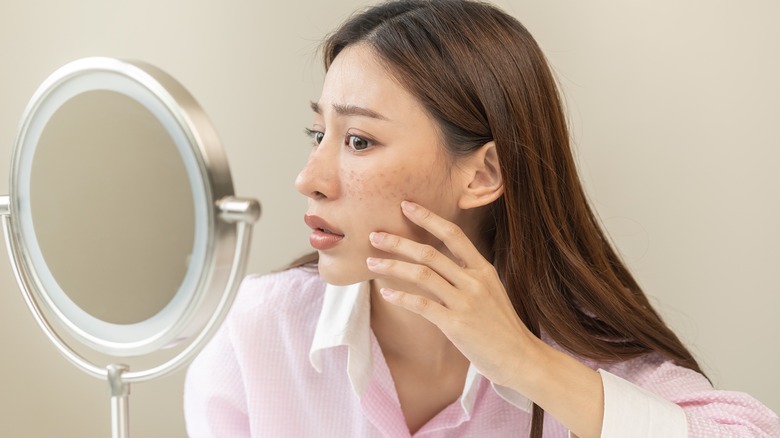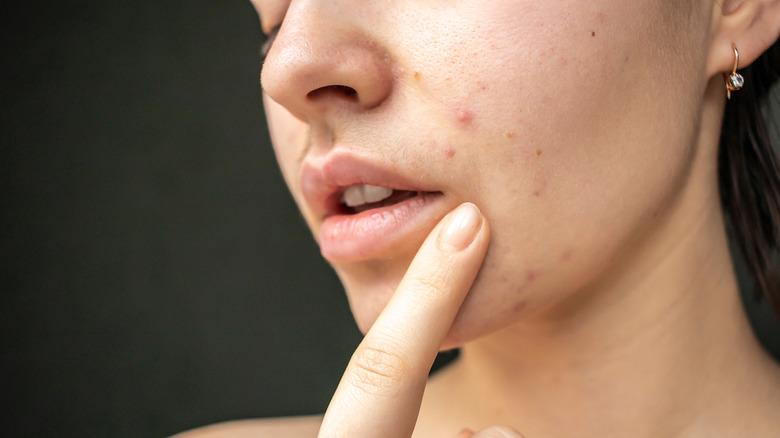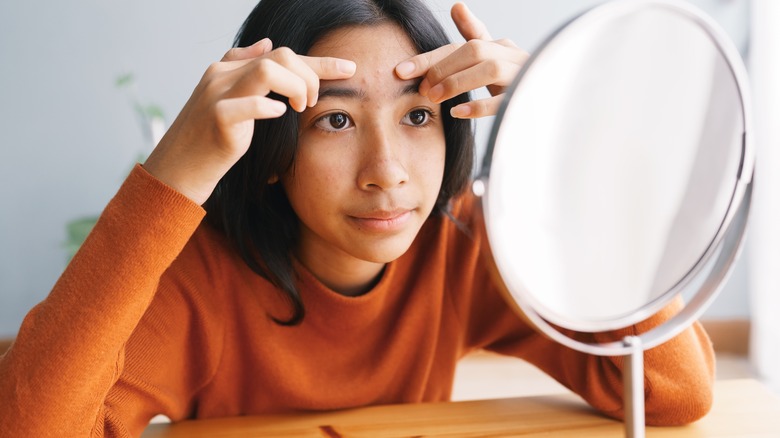How To Tell The Difference Between Hormonal And Fungal Acne
For many people, discovering acne on the body can trigger a slew of insecurities. You're not alone if you're feeling stressed about your acne. It's estimated that 50 million Americans are impacted by acne every year, as reported by the American Academy of Dermatology Association.
Although acne is popularly associated with puberty and adolescence, acne can persist into adulthood. Christopher Bunick, a dermatologist at Yale Medicine, shared that it's common for adult women between the ages of 20 and 40 to seek treatment for their acne from a dermatologist.
Acne occurs on many parts of the body, including the face, back, shoulders, neck, and chest, as explained by Healthline. Someone who has acne may notice blackheads, whiteheads, pustules filled with pus, and cysts.
Acne is caused by oil buildup and dead skin cells that clog hair follicles, according to Yale Medicine. In addition, as a result of sebaceous glands producing large amounts of sebum, the bacteria Cutibacterium acnes (C. acnes) reproduce, causing hair follicles to clog even further.
Certain risk factors could make someone more likely to experience acne. The chances of developing acne may be increased for those with a family history of the skin condition (per Yale Medicine). The development of acne may also be linked to a high glycemic load diet that raises blood sugar levels, though more research is needed.
If you're someone who struggles with acne, you may be interested to learn about the different forms of acne. Let's explore the differences between hormonal acne and fungal acne in particular.
What is hormonal acne?
Aside from genetics and diet, hormones can play a significant role in the development of acne. Changes in hormones can trigger the production of too much sebum, which can contribute to acne (per Cleveland Clinic).
Board-certified dermatologist S. Manjula Jegasothy reported in an interview with Self that hormonal acne is typically attributed to changes in the hormones estrogen and progesterone. The stress hormone cortisol can also contribute to a hormonal acne flare-up when someone is stressed. While "hormonal acne" isn't considered a medical term, it's often used to describe acne that has an underlying hormonal cause.
Alterations in hormones are why many adolescents experience acne during puberty, as explained by Healthline. The T-zone area, also known as the forehead, nose, and chin, is a common place for hormonal acne during puberty.
Adult women can experience hormonal acne when they get their periods, become pregnant, or reach menopause. Hormonal acne may also be more common in women with pre-existing conditions, such as polycystic ovary syndrome.
In adults, hormonal acne most commonly affects the chin and jawline. This could be because many of our oil glands are located on the chin (per Self). Around their menstrual cycle, women with hormonal acne may also notice acne on their back, chest, and shoulders.
After reading about hormonal acne, you might wonder how it differs from fungal acne. Let's take a look and find out.
How is fungal acne different from hormonal acne?
Hormonal acne differs greatly from fungal acne because of the latter's unique cause. Although fungal acne contains the word "acne" in its name, it's actually an infection, according to Healthline. An overgrowth of yeast develops inside the hair follicles. This creates bumps on the skin and skin irritation that are similar to regular acne, hence the term "fungal acne."
There's a high prevalence of fungal acne among adolescents and young adult males, but the condition can happen to anyone (per Cleveland Clinic). Hot and damp skin is an ideal environment for the yeast that causes fungal acne to grow.
People who live in hot and humid environments, sweat a lot, or have weakened immune systems are more likely to develop fungal acne. According to the Wexner Medical Center, fungal acne can occur more frequently during the summer months due to the hot and humid temperatures.
Knowing the difference between fungal acne and other forms of acne is important. Fungal acne doesn't respond in the same way as regular acne to common acne treatments, and some of these treatments can even aggravate the infection (per Healthline). Itchy skin is a key indicator of fungal acne, as regular acne doesn't usually lead to itchy skin.
If you're experiencing fungal acne, you should consult a dermatologist who can provide you with antifungal treatments.



